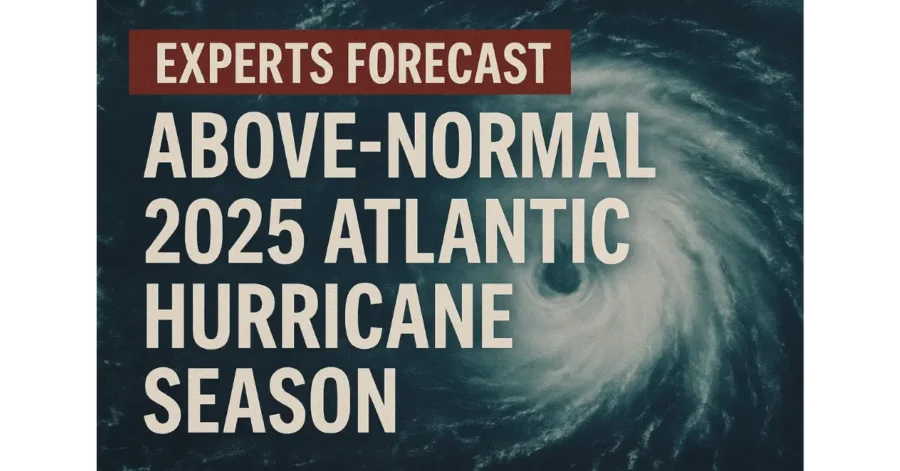
Experts Forecast Above-Normal 2025 Atlantic Hurricane Season
The 2025 Atlantic hurricane season is gearing up to be more active than usual, with experts forecasting an above-normal hurricane season for the Caribbean and surrounding areas. This could mean an increase in the number and intensity of storms from June through November, raising important questions about hurricane preparedness and the potential impact on vulnerable communities in the region.
In this article, we’ll explore the details of the 2025 Atlantic hurricane season forecast, the science behind it, notable historical context, and what residents in hurricane-prone areas—including the Caribbean—should know to stay safe. We also discuss the implications of recent hurricanes like Beryl in 2024 and share insights into the 2025 list of hurricane names, including retired names and what to expect for major hurricanes in 2025.
Understanding the 2025 Atlantic Hurricane Season Forecast
What Does “Above-Normal Hurricane Season” Mean?
An above-normal hurricane forecast 2025 indicates that meteorologists expect more tropical storms and hurricanes than the average season, which typically sees around 12 named storms with 6 hurricanes, 3 of which might be major (Category 3 or above).
For 2025, leading organizations such as NOAA (National Oceanic and Atmospheric Administration) and other meteorological agencies predict heightened activity. This is often based on multiple climatic factors ranging from ocean temperatures to atmospheric conditions such as the state of the West African Monsoon — a major driver of Atlantic storms.
Key Factors Influencing the 2025 Hurricane Season
The Role of the West African Monsoon
One of the largest influences on the Atlantic hurricane season is the West African monsoon hurricane effect. This weather pattern, occurring over West Africa and the adjacent Atlantic, fuels many of the early-season storm formations. A strong monsoon typically correlates with increased tropical cyclone activity in the Caribbean and the wider Atlantic basin. Experts anticipate that the 2025 monsoon will be robust, raising the odds for more frequent and powerful storms.
Ocean Surface Temperatures and Climate Signals
Warmer ocean waters provide the energy hurricanes need to intensify. The 2025 Atlantic hurricane season forecast considers sea surface temperatures across the Atlantic tropical region, which are expected to be above average in many areas. This enhances the potential for storms to develop into major hurricanes.
Other climate signals like the El Niño-Southern Oscillation (ENSO) phase also affect hurricane activity. A neutral or La Niña phase is typically linked to more active hurricane seasons, and forecasters will be closely watching ENSO trends as the season develops.
What Happened in 2024? The Impact of Hurricane Beryl
Last year’s hurricane Beryl 2024 impact left a strong imprint on Caribbean nations such as Grenada. Beryl’s intensity caused serious damage, highlighting the increasing vulnerability of the region to fast-forming and destructive storms. Notably, Grenada hurricane Beryl damage statistics and recovery stories underscore the need for enhanced hurricane preparedness 2025.
Moreover, in 2024, hurricanes Beryl, Helene, and Milton were so consequential that their names will be retired for 2025. This means these names will no longer be used out of respect for the damage and fatalities associated with them, a reminder of the growing impacts of major storms.
The 2025 Hurricane Names List and Retired Names
The World Meteorological Organization announces the official hurricane names 2025 list annually. Since Beryl, Helene, and Milton have been retired, new names will replace them.
This list gives communities, emergency responders, and meteorologists a standardized way to track storms. Knowing and familiarizing oneself with the names ahead of the season can help maintain awareness as storm warnings are issued.
What to Expect: Major Hurricanes and Storm Activity
Forecasts predict several major hurricanes 2025—Category 3 and above—which carry the greatest risk of damage due to high winds and flooding. These storms can topple infrastructure, cause power outages, and lead to long-term displacement for residents.
Given the Category 5 hurricane records Atlantic history, which lists some of the most devastating and powerful hurricanes in recent memory, the 2025 season could approach or even exceed these extremes if conditions persist.
The Caribbean Hurricane Season Forecast: What It Means for Residents
The Caribbean hurricane season forecast underscores the importance of early planning for island nations and coastal areas. Given their exposure to Atlantic storms, the region remains on high alert, especially after recent seasons’ impacts.
Essential Hurricane Preparedness for 2025
- Stay informed: Regularly monitor updates from meteorological agencies like NOAA and local authorities.
- Emergency kits: Prepare hurricane kits including food, water, medications, and important documents.
- Evacuation plans: Understand your community’s evacuation routes and procedures.
- Protect property: Reinforce windows, doors, and roofs against high winds.
- Insurance check: Review home and business insurance policies for hurricane coverage.
Two Perspectives on How the 2025 Season Could Unfold
Perspective 1: An Intensified Hurricane Season
Many experts predict a notably active season with multiple storms reaching major hurricane status. This scenario highlights the need for stringent disaster preparedness, especially in vulnerable areas like the Caribbean and Gulf of Mexico.
Perspective 2: The Role of Advances in Hurricane Prediction
Improved satellite technology and predictive models (like NOAA’s updated forecasting systems) could help mitigate impacts by providing longer lead times for warnings. These advances may help communities better prepare and respond, potentially lowering casualties even if storm frequency remains high.
Summary: Preparing for the 2025 Atlantic Hurricane Season
With the NOAA 2025 hurricane forecast and other global agencies calling for an above-normal hurricane season, it’s time for residents, governments, and businesses in the Americas and the Caribbean to take proactive steps. Understanding the factors behind this forecast — including the West African monsoon and sea surface conditions — lays the foundation for resilient response planning.
Major hurricanes remain a formidable threat, but with improved forecasting and community preparedness, the 2025 season’s impact can be mitigated. Stay vigilant, heed official advice, and be ready to act when the storm season arrives.

